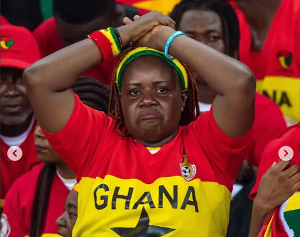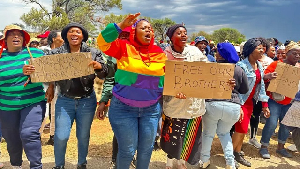THE Minister for Education and Sports has dared the opposition National Democratic Congress to take Government to court over the implementation of the Free Compulsory Basic Education Policy.
While the NPP?s ability to implement the constitutional requirement has received overwhelming acclaim from the public, the NDC has sought to counter that by asking for FCUBE to be extended to the private schools, as well. In an answer to a question by our reporter at yesterday?s news conference here in Accra, Yaw Osafo-Maafo accused the NDC of hypocrisy, and dared: ?We are waiting for the court matter; they should go to court and we shall all be there.?
The Education Minister, who was taking his turn at the weekly meet the press series, described the NDC?s threat as ?interesting.? He stressed that the implementation of the FCUBE policy ?does not apply to private schools and it cannot be.?
Mr Osafo-Maafo said, with competing priorities for resources, he found it difficult to comprehend the NDC position that Government should use its scarce funds to support pupils in private schools when in fact they ?have a choice.? The Minister, who is also MP for Akyem Oda, said resources would be better spent to improve the quality of public schools, which are patronised by the majority of students.
?The public schools are there and we are trying to improve upon them and make the best out of them and this is where we are talking about fee free compulsory education for the public.?
The NDC ? led by Yaw Ofosu Ampofo, National Organiser, and Mahama Ayariga, MP for Bawku Central and Minority Spokesperson for Legal and Constitutional Matters ? is arguing that with the decision to absorb the fees of only students in the public schools, Government was denying Ghanaian children in private schools their constitutional right to Free Compulsory Basic Education. Article 38(2) of the Constitution provides: ?The Government shall within two years after Parliament first meets after the coming into force of this Constitution, draw up a programme for implementation within the following ten years for the provision of free, compulsory and universal basic education.?
Armed with this provision of the Constitution, the NDC?s position is that the Constitution, ?unlike the NPP Government,? does not discriminate against students in private schools when it comes to benefitting from the FCUBE policy. But yesterday, the Education and Sports Minister categorically stated that Government was right in its decision to limit the implementation of the policy to schools in the public system and will, therefore, not be deterred by the NDC in the implementation of the policy. He has accordingly dared the NDC to go to court if it thinks it has a case against Government on the true interpretation of Article 38(2).
The Minister pointed to the Basic Education Sector Improvement Programme policy document, which was prepared and presented to Parliament for debate, to defend Government?s position that the absorption of school fees of Ghanaian children at the basic level shall be limited to those in the public schools. It provides: ?Tuition shall be free in all Basic Schools.?
Section four of the policy document prepared in April 1996 by the then Ministry of Education also provides: ?Equipment shall be supplied free for all Basic Schools in the public System.?
Minister recalled that the NDC majority fiercely defended the above provisions when the document was laid before the House for debate and could, therefore, not understand why the NDC was today going back on its earlier position. The Minister?s challenge to the NDC comes some three weeks after the Association of Public Schools issued a statement to condemn the NDC for attempting to make political capital out of the exclusion of private schools in the implementation of the FCUBE policy.
Meanwhile, the Minister has announced that Government will this month release ?56 billion, being 50% of the total cost of implementing the capitation grant. The Minister hoped that ?the introduction of the grant and the abolition of school levies in public basic schools at the national level should have a huge effect on the enrolment and participation for pupils and students as it should remove a major barrier to access and retention.?
He announced that the remaining 50% of the total cost of the programme which is pegged at ?113 billion will be released before the close of the year. This, he said, will be after new enrolment figures have been received by his Ministry. Expressing satisfaction at the enrolment into both public and private schools, saying that it was an indication that his Ministry was on the ?right course? towards achieving its goals, Mr Osafo Maafo stated that the NPP government has indeed delivered on its campaign promise to make high quality education affordable and accessible.
Total enrolment at the public schools between 2004/2005, according to the Minister, stood at 3,698,479 while the figure for the private schools worked up to 1,189,953 for the same academic year.
Enrolment at the tertiary level also increased from 87,929 in 2003/2004 to 98,393 in 2004/2005. This, he said, represents an increase on 11,132 during that academic year.
He however bemoaned the dwindling number of students pursuing Science and Technology courses at the tertiary level, but stated that Government was taking measures to, in line with its policy of encouraging the learning and teaching of such subjects, reverse the trend.
Mr Osafo Maafo also disclosed that his Ministry was expecting 300,000 learners to be enrolled this year under the Non-formal Education Programme.
The rapid increases in enrolment at all levels, the Minister said, put pressure on the use of limited facilities and resources hence ?more resources and facilities will have to be provided to accommodate the increases.?
He, therefore, lauded Government for injecting huge investments in the improvement and expansion of infrastructure in the education sector.
General News of Friday, 2 September 2005
Source: Statesman
















